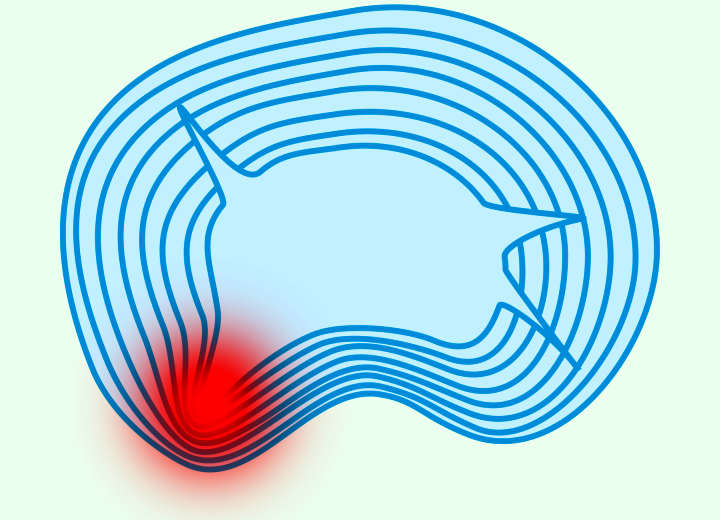To provide services at the highest level, we use cookies. Using the website requires you to choose settings related to their storage on your device. If you want to know what each type of cookie is used for, click the Details button below.
Intervertebral disc herniation – causes, consequences, treatment15 kwietnia 2023 |

Intervertebral disc herniation is a common condition that can negatively affect a patient's quality of life. Although the causes of herniated discs may vary depending on the individual, there are certain risk factors that can be identified.
One of the most common risk factors is age. The older a person gets, the greater the likelihood of developing an intervertebral disc herniation. This is due to the natural process of aging, which weakens the intervertebral discs, commonly referred to as discs. As a result, they lose elasticity and resilience, and also wear down with age.
Another important risk factor is lack of physical activity. Individuals who lead a sedentary lifestyle or work in a sitting position for extended periods are more susceptible to intervertebral disc herniation. The reason for this is improper distribution of body weight and the lack of movement associated with such a lifestyle, which puts undue stress on the spine.
Excessive stress on the spine caused by other difficulties is also a risk factor for the development of intervertebral disc herniation. Physical work, lifting heavy objects, and daily activities such as carrying a handbag or heavy folders are factors that can lead to intervertebral disc damage and cause herniation.
Certain diseases can also increase the risk of developing intervertebral disc herniation. These include diabetes, but increasingly also obesity, as well as the common condition osteoporosis, which weakens the bones. These factors directly affect the condition of the intervertebral discs, which can ultimately lead to spinal herniation.
The causes of intervertebral disc herniation are diverse and encompass many risk factors. Among the most important are age and lack of physical activity, but also the typical excessive stress on the spine of the 21st century and certain diseases. Therefore, it is worth taking care of your body and regularly performing appropriate back-strengthening exercises to reduce the risk of its occurrence.
There are various treatment methods for a herniated disc that can help reduce pain and significantly improve the basic functions of the spine. However, many people wonder if herniated disc treatment requires surgery.
Not every case of herniated disc requires surgical intervention. In many cases, it is possible to treat with manual therapy and back exercises that mainly aim to strengthen muscles and reduce spinal load. It is worth remembering that regular physical activity is crucial for spinal health and may help prevent recurrence of the disc herniation.
In cases where symptoms are severe and persistent, and conservative treatment does not produce the desired effects, a doctor may decide to perform surgery. The operation involves removing the damaged intervertebral disc or its fragment, which compresses the spinal nerves. Performing surgery is associated with some risk and a long process of rehabilitation and recovery.
Recently, there have been modern techniques for treating a herniated disc that allow for avoiding surgery. One such method is therapy using shock waves, which works on the principle of mechanical dissolution of the damaged intervertebral disc. This therapy does not require hospitalization or a long rehabilitation period, making it a very attractive alternative to traditional surgery.
For individuals with a herniated disc, it is also important to maintain proper sleep hygiene during both treatment and rehabilitation, as well as at any other time, as this can affect their health status. Attention should be paid to appropriately selecting a mattress and pillow that enable the spine to maintain a natural position, reducing the load on the intervertebral discs, which affects pain reduction and improvement in sleep quality.
For individuals with a herniated disc, it is important to choose mattresses with appropriate firmness and elasticity. Mattresses with inappropriate firmness, significantly deviating from 6 or 7, can lead to incorrect alignment of the spine, increasing the risk of developing back pain and worsening the health status of the spine. It is worth paying attention to the Osaka Air mattress, which has a perfectly matched firmness and dynamics optimal for maintaining health.
It is also important to choose an anatomically shaped orthopedic pillow that provides appropriate support for the neck. This is a very important element in the life of individuals with a herniated disc. It reduces muscle tension and eliminates excessive spinal load, which directly affects pain reduction and improvement in sleep quality.
The most common symptoms of a herniated disc are back pain, tingling in the limbs, and weakness in the muscles. Discomfort in the chest or abdomen area may also occur.
Yes, the right pillow can help reduce pain and muscle tension around the spine area, which can speed up the healing process of a herniated disc. Orthopedic pillows, especially special sleeping pillows for side and back sleepers, can help improve posture and provide extra support for the spine.
Yes, anyone can develop a herniated disc regardless of age or gender. However, certain risk factors such as heavy physical work, postural abnormalities, or genetic predispositions can increase the risk of developing this condition.
Factors that contribute to the development of a herniated disc mainly include spinal injuries, postural abnormalities, heavy physical work, prolonged sitting at a desk, or genetic predispositions. Therefore, it is important to maintain proper posture and avoid excessive exposure to risk factors to reduce the risk of developing this condition.
Mattresses for people with a herniated disc should be made of materials that provide proper support and relief for the spine. As such, people with this condition should avoid spring mattresses, as well as those with memory foam in the top layer. The best mattresses for them are made of high-density and firmness foam, reinforced with memory foam in the second layer.